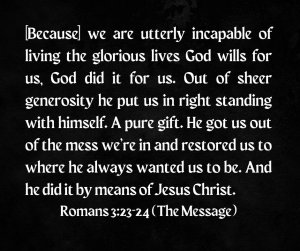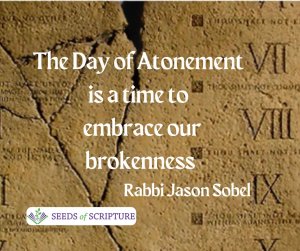Embracing Yom Kippur: Humility, Grace, Gratitude
Topics to Dig Into
 It’s the most important day of the Hebrew calendar.
It’s the most important day of the Hebrew calendar.
It’s a day to make things right, to repair relationships with people, with God, and with God’s creation. Yom Kippur follows Rosh Hashanah by ten days, a period of renewal, repentance, and remembering who God created us to be. They are ten Days of Awe, contemplating afresh our magnificent, powerful, generous, merciful, and holy God.
In ancient Jewish history, the entire community gathered once a year at the tabernacle, and later the Temple, to participate in Yom Kippur, the Day of Atonement. They solemnly observed the priest who, behind a thin screen, cleansed himself meticulously from head to toe. They hardly recognized the man who emerged dressed in pure white linen (Lev 16:3-4), accustomed as they were to the priest’s ceremonial gem encrusted, gold plated ephod (Ex 28:6-30). In this ritual, the priest represented purity, humility and contrition; his precise compliance in purification meant life or death.
I imagine the people held their breath as their representative passed through the thick, heavily embroidered curtain into the Most Holy Place, the only place God’s presence met the people. The cherubim embroidered into the curtain (Ex 36:35) reminded the Israelites of their exile from the Garden of Eden (Gen 3:23-24) where God dwelled with humanity before sin entered the world.
As the priest disappeared behind the curtain carrying the atoning sacrificial blood, they intently watched for the slightest movement of the rope visible from under the curtain. If it remained still too long, then God had rejected their sacrifice and they’d pull the deceased priest from the Most Holy Place by the rope tied to his ankle.
Imagine the anticipation and collective sigh of relief each time the priest reemerged! He repeated the washing, dressing, and disappearing ritual three times, first for himself, then for the other priests, and finally for the sins of all the people. If any of them harbored sin in their hearts, the sacrifice might be rejected.
Consider this: Jesus likely participated in Yom Kippur throughout his lifetime.
 And when His blood poured out on the cross, Jesus served as the high priest carrying his own atoning sacrifice through the curtain to meet God (Hebrews 7:26-27). Matthew, Mark and Luke all report that the curtain tore from top to bottom (Mt 27:50-51), removing the cherubim guards and opening the way to God for all believers. Jesus fully and finally atoned for our sin.
And when His blood poured out on the cross, Jesus served as the high priest carrying his own atoning sacrifice through the curtain to meet God (Hebrews 7:26-27). Matthew, Mark and Luke all report that the curtain tore from top to bottom (Mt 27:50-51), removing the cherubim guards and opening the way to God for all believers. Jesus fully and finally atoned for our sin.
But the Jewish sacrificial system continued until 70 A.D. when the Temple was destroyed, including the Most Holy Place.
Today, Jews observe Yom Kippur with a solemn day of humility, confession and mending relationships with God and people. I was privileged to accompany a Jewish friend to an evening Yom Kippur service which began with this prayer:
Once more Atonement Day has come. All pretense gone, naked heart revealed to the hiding self, we stand on holy ground… We tremble. At what did we aim? How did we stumble? What did we take? What did we give? To what were we blind? Last year’s confession came easily to the lips. Will this year’s come from deeper than skin? Say then: why are our paths strewn with promises like leaves? Say then: when shall our lust be for wisdom? Say now: love and truth shall meet; justice and peace shall embrace.
O Hope of Israel: in our weakness, give us strength. In our blindness, be our guide. When we falter, hold our hand. Make consistent our impulse for good; let us know the joy of walking in your ways.
(from the Prayer Book for the Days of Awe)
My summary of this beautiful prayer is this: We failed to keep last year’s promises. When will we learn? That’s precisely why Jesus lived as a sinless human and died, because humans can’t avoid sin. Oh how many ways we offend God!
The Jews intentionally acknowledge their shortcomings in this alphabetic confession:
We all have committed offenses; together we confess these human sins: The sins of arrogance, bigotry, and cynicism; of deceit and egotism, flattery and greed, injustice and jealousy. Some of us kept grudges, were lustful, malicious, or narrow-minded. Others were obstinate or possessive, quarrelsome, rancorous, or selfish. There was violence, weakness of will, xenophobia. We yielded to temptation, and showed zeal for bad causes.
(from the Prayer Book for the Days of Awe)
Pause a moment. Reread each named sin. Confess if you wish.
For all have sinned and fall short of the glory of God
Romans 3:23
 Alongside the Jewish congregation I positioned my heart before God with humility and confession, not to feel badly about myself but to grasp how much I need a Savior. Comprehending the magnitude of God’s grace yields humility and deep gratitude.
Alongside the Jewish congregation I positioned my heart before God with humility and confession, not to feel badly about myself but to grasp how much I need a Savior. Comprehending the magnitude of God’s grace yields humility and deep gratitude.
Their prayer continued:
What can we say before You, who dwell on high? What shall we plead before You, enthroned beyond the stars? Are not all things known to You, both the mysteries of eternity and the dark secrets of all that live? You search the inmost chambers of the heart, and probe the deep recesses of the soul. Nothing is concealed from Your sight.
(from the Prayer Book for the Days of Awe)
Exposed. Fully known. A humble servant deeply loved by an infinite God. I found the intentional, solemn practice intensely freeing (and missing from my practice).
I’m curious about your practices (so please share in the comments!):
- What is your practice of confession?
- How is it meaningful to you?
- How would a full day of focused humility before the infinite God impact you?
Dig in friends! Explore the many scripture references by clicking the colored text. I wrote about the meaning of Rosh Hashanah in the last post. The Bible Project’s podcast on the Day of Atonement is enlightening, especially on The Bible Project mobile app. TBN’s series God’s Appointed Times with Rabbi Jason Sobel has been a helpful resource as well.
#SeedsofScripture #scripturestudy #YomKippur #RabbiJasonSobel #TheBibleProject #daysofawe #dayofatonement #humbleyourself #humblesoul

I wonder, shouldn’t every day be spent in humility before God? I don’t have a special day of atonement or a special time for confession, but I do try and practice it “in the moment.” When I am convicted of my sin is when I need to confess and seek forgiveness. Not that I have not already been forgiven of it through the blood of Christ, but I need to “admit and accept” in the moment. I do have one special time reserved for confession. Right before I drift off to sleep each night I ask God to forgive me for those sins I’ve not yet recognized. I say it that way because I have no doubt of His conviction of them, but I have not yet recognized or responded. I’m certain that God will continue to guide me to repentance, but in going to sleep with a clear conscience, I’m able to better rest in Him. Hope that makes sense my friend.